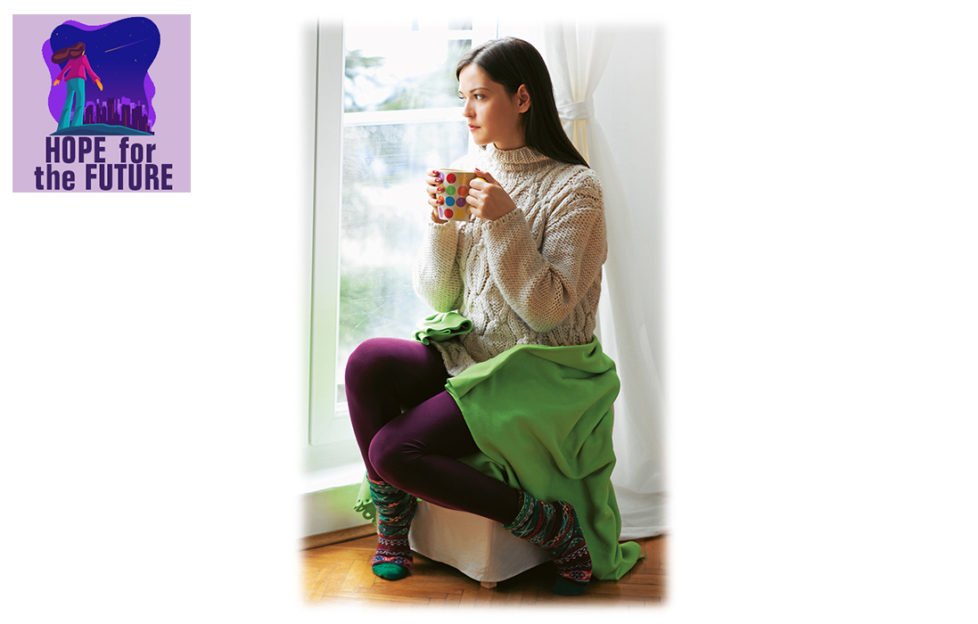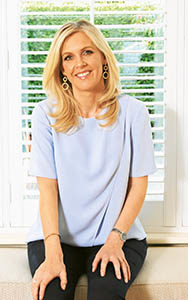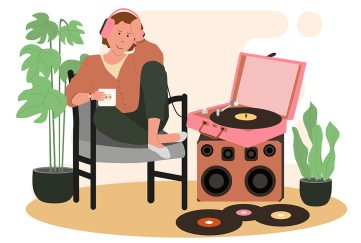The Coffee Morning by Sinead Moriarty

She felt so utterly and terribly alone with her grief – until she found a way to put it to good use…
Rachel popped her head in to say goodbye. Frank was lying back on the pillows, eyes closed.
When he was asleep he looked like himself, like he used to. It was his eyes that told the story. His eyes carried the pain and the anguish. They told of the lost dreams, the fading hope, the fear.
She tried to avoid looking into them these days; it was too much. She needed to stay strong.
The children needed her to be their everything now. She couldn’t sit about crying and wishing things were different. This was life, these were the cards she had been dealt.
She remembered going to see a fortune teller when she was sixteen, who had told her, “You will marry a handsome man, have two children, and live a long and happy life.”
It had all come true – except the long and happy bit.
Well, she might live a long life, but the happiness was something that had been taken away. It was as if all the lights in the house had been dimmed.
She could see it in the children’s faces. They were pale and drawn. Their previously rosy cheeks remained pasty no matter how much fresh air she forced upon them.
Lucy didn’t bound around the house, dancing and laughing. Jake spent most of his time in his room playing angry music on his iPod.
Rachel tried to do fun things with them but lately she felt so tired all the time it was hard to muster the energy.
She was afraid they were all grieving alone, waiting for the inevitable day when four became three.
Their family was going to shrink, they all knew it. It was just a matter of time – but how much time? The doctors didn’t know. Some days she wished for him to suffer no more, but then she’d panic and wonder how she could live without him.
On good days he could type. She could talk to him and ask his advice about the kids and he’d type the answers and often even make her laugh. It was amazing that despite the pain and the loss of his tongue, he could still manage to be funny.
Those moments were fewer now. He hadn’t communicated with her in a week. He’d just smiled weakly as she whispered to him.
The nurses were a Godsend. They came in like angels and took over.
He needed more help now. She needed more help now… they all did.
She’d often find one of the nurses chatting to Jake or Lucy over a cup of coffee in the morning. She liked that they felt comfortable enough with these angels of mercy to talk to them and ask them questions. They knew what to say, they knew how to give comfort without offering false hope.
Rachel kissed her husband’s clammy forehead, and told the nurse she’d be back in an hour or so.
On her way out she glanced at her reflection in the mirror. Tired. She looked permanently tired and no amount of make-up could hide it.
Her dress was hanging off her – stress and grief had made her thin. She’d always wanted to be thin, yet now she was and she was miserable.
She sighed and put on her coat. As she picked up her bag she hesitated.
Why was she going to this coffee morning? She knew she’d hate it. She always felt like an outsider now.
It was as if her life made her toxic.
People would avoid sitting beside her or if they got stuck with her, they’d ask her how she was and tilt their head sympathetically while their eyes darted about, wondering how quickly they could get away.
She didn’t know how to answer the How are you? question any more. Do you say “fine” and move on, or do you tell them how it really is? Do you go into the horrors of your daily life and describe the anguish of watching your husband die a slow and painful death?
Her best friend, Sarah, had told her to just say “fine” so she wouldn’t scare people away.
“Tell me the awful stuff, but when you’re out with other people just try to keep it… well… a bit more neutral. Talk about the kids or books you’ve read or movies you’ve seen… just chit-chat.”
However, Rachel – who had been the queen of coffee mornings when the kids were young – didn’t know how to do chit-chat any more.
Before Frank fell sick, she had loved the camaraderie of sitting around with other mums, talking about their husbands or their kids or life in general and laughing – always lots of laughing.
Rachel had been funny then. She’d had a personality then. She’d been someone people wanted to sit with then…
She took a deep breath and forced herself through the door. She had to get out. She couldn’t stay in the house all the time, it was pulling her under.
Her counsellor had told her that it was extremely important that she get out. He said she needed to engage with the outside world. He said she mustn’t cut herself off, it was bad for her and for her children.
“I know it’s difficult but you must go out and be with other people,” he’d said.
She closed the door behind her. Her stomach was doing flips.
This was ridiculous, it was a stupid coffee morning of mums in Lucy’s class. Why was she feeling so nervous? She’d known at least five of the mums for over six years.
The mum hosting the coffee morning was Alice, who Rachel had met on Lucy’s first day at junior school.
Alice was lovely and had become a good friend. She was incredibly kind and generous. Since Frank’s diagnosis she had showered them with food and gifts and books about positivity.
Rachel appreciated it all so much, but the only problem was that Alice was an eternal optimist.
She would never allow Rachel to talk about the possibility of death or “the end”. Rachel had found this very frustrating. Frank was going to die and she needed to talk about it.
Alice would just say, “Don’t be pessimistic, he might pull through. Miracles happen every day. If you think positive thoughts, positive things happen.”
Eventually, Rachel had begun to avoid her.
She couldn’t take Alice’s relentless everything will be all right if you think happy thoughts advice.
She’d stopped returning Alice’s calls and when she bumped into her at the school gate she’d say she was sorry, but things were crazy and she’d call her later for a chat.
Rachel knew Alice felt hurt but she had to protect herself. She couldn’t take the unyielding optimism.
She needed to be realistic, needed to be able to talk about the death that was coming to her house very soon.
However, last week Alice had cornered her and insisted that she come to this coffee morning – and she wasn’t taking no for an answer. Rachel had agreed to go and so here she was, standing outside Alice’s house.
Alice rushed to answer the door and gave her a big hug.
“I’m so glad you’re here.”
Alice really was a kind soul, and Rachel felt bad about avoiding her.
“Thanks Alice, you’re great.”
“Don’t be mad, sure it’s only a few buns and a cuppa, but I thought it’d be good for you to get out of the house.
“Mind you, I’m sure it’s nice spending time with Frank. In a way it’s probably nice to have him at home all the time, I wish I saw more of Donal, sure he’s never home.”
Rachel plastered a smile on her face.
She tried not to let the comment irritate her. Alice meant well.
Rachel followed her into the vast kitchen where eight women were already drinking coffee and chatting. The conversation stopped when she walked in.
They got up to greet her. Some were overly cheerful, some hugged her whispering, “I’ve been thinking of you”, and the ones she didn’t know well just smiled and said hello.
Rachel sat beside Grace, a mum she knew quite well.
“So I was just telling the girls here that I got Dave a gym membership for Christmas and I may as well have burned the money. He never goes and he’s getting fatter by the minute. All he does is shove doughnuts down his cake hole!”
The other women all laughed. Rachel smiled. It was funny, but her ability to laugh easily had gone.
“Be careful what you wish for,” Jackie said. “Kevin took up cycling last year and he’s never home. Up at seven and gone for hours cycling up mountains in his tight Lycra shorts.
“Honestly, I don’t know what he does all day. He could well be up to no good with someone in his cycling group for all I know. Good luck to him if he is, it gets me off the hook.”
The women all cackled and hooted at this comment. Rachel couldn’t remember the last time she had sex with Frank. Over a year ago, anyway.
She missed intimacy. She still climbed into bed beside him and held him sometimes, but she missed the way their bodies used to wrap around each other.
She knew she should laugh, so she did.
It sounded fake to her, but no one seemed to notice.
Rachel wished she could feel normal again. She felt like an outsider all the time now. Her head was so full of worry and stress there wasn’t room for chit or chat.
Yet she wanted this, she wanted to be laughing and joking. She wanted to be the old Rachel but she knew she couldn’t be. The old Rachel was gone. Would she ever come back? Would she ever be able to chit and chat again?
Someone was talking about their au pair being useless. Rachel knew this was a real problem for this person, but everything seemed silly to her now.
She tried to focus her mind on the conversation. Everyone’s problems are relative to their lives, she reminded herself. But it all seemed so trivial.
Someone else was talking about their daughter having lice three times and how stressful it was.
Rachel nodded and tried not to scream, My husband is dying! Who gives a damn about stupid lice!
She forced herself to remember that she once thought lice a huge problem. It’s not their fault my husband has cancer. She tried to breathe and keep calm.
Suddenly the woman sitting opposite Rachel dropped her cup.
It smashed on the Italian marble floor. Heads turned.
“God, I’m so sorry.” The woman looked upset.
Alice tried to reassure her.
“It’s not fine,” the woman said, beginning to cry. “It’s not fine at all. I’ve just been diagnosed with Parkinson’s…”
There was an audible intake of breath. Everyone looked shocked and embarrassed. An awkward silence filled the room.
Rachel knew what to do. Rachel knew what to say. Rachel understood.
Rachel could help. Rachel could be a friend to this woman. Rachel wasn’t the outsider any more. Rachel wasn’t alone in her pain.
Rachel walked over to her, put her arms around her and said, “I’m so sorry, what a terrible shock. Now, sit with me and tell me everything.”
“Thank you,” the woman said, and she began to talk…





